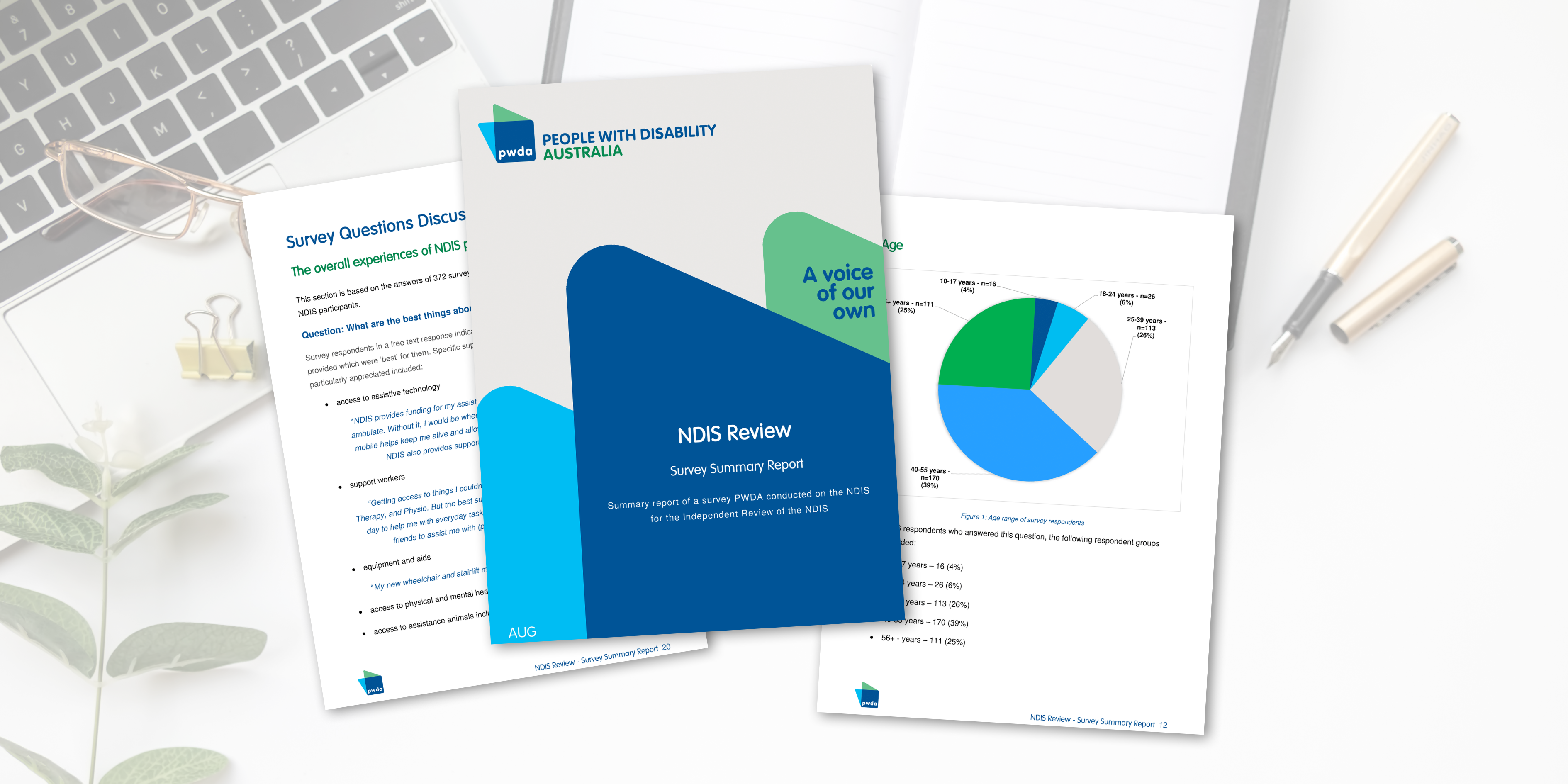
From March to May 2023, People with Disability Australia (PWDA) conducted a survey to hear directly from Australians with disability about their experiences with the National Disability Insurance Scheme (NDIS). The responses were used to shape our submissions to the independent NDIS review.
What is the NDIS Review?
The Minister for the NDIS, The Hon Bill Shorten MP announced the independent review of the NDIS (the NDIS Review) on 18 October 2022.
The review has been conducted by an independent panel co-chaired by Professor Bruce Bonyhady AM and Ms Lisa Paul AO PSM.
An overarching goal of the NDIS Review is to ensure the NDIS works well for participants.
What did we hear in our survey?
PWDA heard from 441 people. 372 of the valid responses were from people with disability who were a NDIS participant, and 69 responses were from people with a disability who were not currently a NDIS participant.
Further demographic data collected from respondents shows a diverse cross-section of the Australian disability community participated in the survey. Some key themes emerged from the responses to our survey which highlighted the NDIS’ problems, successes and potential solutions.
We heard the NDIS is changing lives, and has the potential to change even more
We asked what were the best things about the NDIS.
- We were told the NDIS supported participant’s growth as a person, kept them thriving in life, and significantly improved their wellbeing.
- We heard the NDIS allowed participants to live with increased dignity through promoting independence and improved community access.
- We heard participants would not be able to engage in many services and activities without the funding because of cost and lack of supports.
- We heard participants were largely grateful for the NDIS – when it was working well.
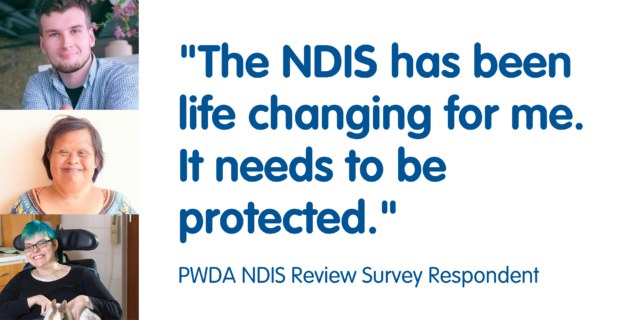
So, we’re asking for a fully funded NDIS – it’s changing lives already, but it has the potential to change even more.
We heard that accessing the NDIS can be challenging
We asked about people’s experiences accessing the NDIS.
- 6 in 10 NDIS participants we spoke to found accessing the NDIS very difficult or somewhat difficult.
- We heard that the process to receive funding took an excessively long time and caused distress.
- We heard it was difficult to understand the application and planning process, and how to progress an access request.
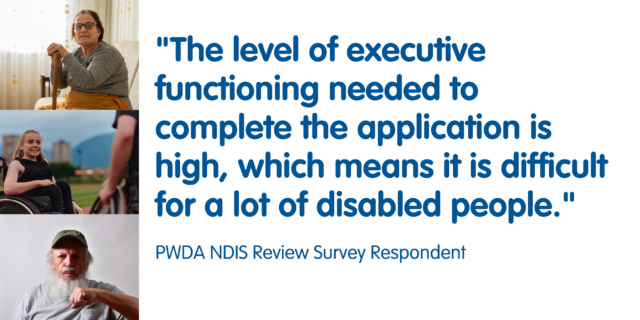
So, we’re asking for timely decision-making for access requests and to remove barriers to accessing supporting documentation.
We heard the planning process could be improved
We asked about NDIS participants experiences with the planning process.
- One in three participants described their planning meeting as very difficult, often due to a lack of understanding and acknowledgment from planners.
- We heard the planning meeting experience can be stressful, confusing, and overwhelming.
- The experiences we heard highlighted the need for a system where planners listen and value the participant’s expertise in their disability.
- We heard it was a negative experience when participants did not feel listened to during the meeting, there was little to no questioning about their actual disability needs, the meeting felt rushed or it was not clear supporting documentation had even been read.
- We heard it was a positive experience when a participant’s disability and needs were understood, and/or because they had a good advocate who provided support.
- We heard it was a positive experience when the expertise of a participant’s understanding of their disability and how their needs can be supported was acknowledged.
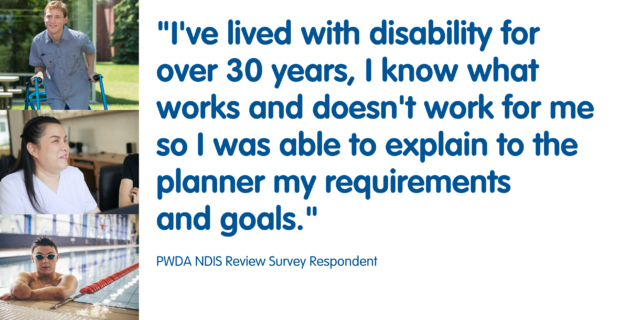
So, we’re asking for planners to listen to the participant during planning meetings, and for processes that recognise and value participant expertise in their disability.
We heard there were barriers preventing participants from getting the most out of their NDIS Plan
We asked if participants experience any barriers getting the most out of their NDIS plan.
- Almost 1 in 2 NDIS participants said they had trouble finding providers that met their needs.
- Approximately 1 in 2 NDIS participants said the supports they needed were not included in their plans.
- We heard that in many local areas there were a lack of service providers, and long wait lists when they were available.
- We heard participants often had to travel long distances to access activities and services which was seen as detrimental to your wellbeing.
- We heard participants faced difficulties in getting a support worker and support workers and carers with the competency and skills to provide quality service, for example communicating with people with complex disability such as deafblind.
- We heard flexibility in the NDIS was a good thing, and where there was not enough flexibility and choice and control needs were unmet.
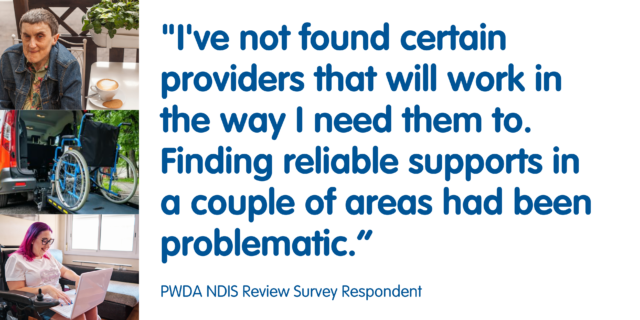
So, we’re asking for participants to be able to review plans before they’re finalised, and for all participants to be able to have equitable access to all NDIS services and supports, regardless of where you live.
We heard the NDIS can do better to meet the diverse needs of the disability community
We heard NDIS services and support for people from diverse backgrounds, especially LGBTIQA+ people with disability, is lacking.
- We heard this meant some people with disability from diverse backgrounds had unmet needs.
- We heard that a lack of dedicated services for LGBTQI+ persons with disability was seen as a barrier by some to getting the most out of their NDIS plan.
- We heard that services would provide more inclusive support if they improved their policies and training.
- We heard that it would be beneficial for NDIA and NDIS workers to undergo training to understand the needs of people with disability from diverse backgrounds and in providing trauma informed support.
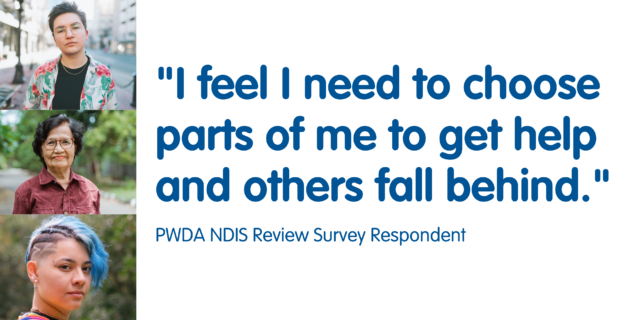
So, we’re asking that any changes to the NDIS and NDIS services meet the needs of people with disability who may also identify as First Peoples, LGBTIQA+ and / or culturally and linguistically diverse.
Read the full survey summary report and learn more about what we’re asking for.
Our publications
- Report: NDIS Review: Survey Summary
- Report: NDIS Review: Housing Survey Summary Report
- Media release: PWDA Responds to NDIS Review
- Submission: NDIS Review of Participant Safeguarding
- How the NDIS could work better for me – Cat Walker
- Why we need the NDIS – Cheryl Knight
Get in touch
If you would like more information or want to discuss any part of this project, please contact us by email at pwd@pwd.org.au or call 1800 422 015.
Ends | Contact us

I believe medical professionals need to lead or take an active part in decision making. Occupational Therapists, or several to use with each relevant client in their field of expertise would be ideal. How can a non medical person possibly understand what a ‘Traumatic Tear of the Long Thoracic Nerve of Bell’ will do to everyday life. 🤔